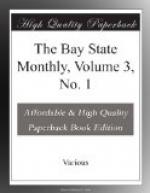Mr. Coffin’s tastes led him toward journalism. From 1850 to 1854 he was a constant contributor to the press, sending articles to the Transcript, the Boston Journal, Congregationalist, and New York Tribune. He was also a contributor to the Student and Schoolmate, a small magazine then conducted by Mr. Adams (Oliver Optic).
He was for a short time assistant editor of the Practical Farmer, an agricultural and literary weekly newspaper. In 1854 he was employed on the Boston Journal. Many of the editorials upon the Kansas-Nebraska struggle were from his pen. His style of composition was developed during these years when great events were agitating the public mind. It was a period which demanded clear, comprehensive, concise, statements, and words that meant something. His articles upon the questions of the hour were able and trenchant. One of the leading newspapers of Boston down to 1856 was the Atlas—the organ of the anti-slavery wing of the Whig party, of the men who laid the foundation of the Republican party. Its chief editorial writer was the brilliant Charles T. Congdon, with whom Mr. Coffin was associated as assistant editor till the paper was merged into the Atlas and Bee.
During the year 1858 he became again assistant on the Journal. He wrote a series of letters from Canada in connection with the visit of the Prince of Wales. He was deputed, as correspondent, to attend the opening of several of the great western railroads, which were attended by many men in public life. He was present at the Baltimore Convention which nominated Bell and Everett as candidates for the Presidency and Vice Presidency in 1860. He travelled west through Pennsylvania, Ohio, and Indiana, before the assembling of the Republican Convention at Chicago, conversing with public men, and in a private letter predicted the nomination of Abraham Lincoln, who, up to the assembling of the convention, had hardly been regarded as a possible candidate.
He accompanied the committee appointed to apprise Mr. Lincoln of his nomination to Springfield, spent several weeks in the vicinity—making Mr. Lincoln’s acquaintance, and obtaining information in regard to him, which was turned to proper advantage during the campaign.
In the winter of 1860-61, Mr. Coffin held the position of night editor of the Journal. The Southern States were then seceding. It was the most exciting period in the history of the republic. There was turmoil in Congress. Public affairs were drifting with no arm at the helm. There was no leadership in Congress or out of it. The position occupied by Mr. Coffin was one requiring discrimination and judgment. The Peace Congress was in session. During the long nights while waiting for despatches, which often did not arrive till well toward morning, he had time to study the situation of public affairs, and saw, what all men did not see, that a conflict of arms was approaching. He was at that time residing in Maiden, and on the morning after the surrender of Sumter took measures for the calling of a public meeting of the citizens of that town to sustain the government. It was one of the first—if not the first of the many, held throughout the country.




